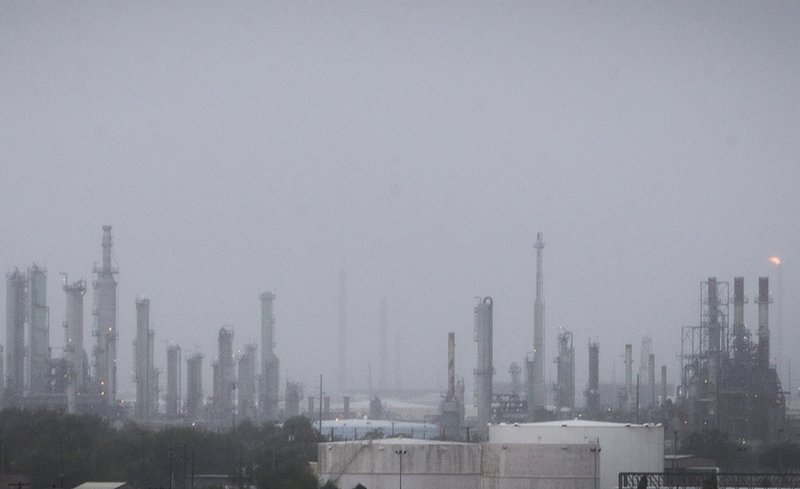DALLAS -- Key oil and gas facilities along the Texas Gulf Coast have temporarily shut down as Harvey pounds the region with torrential rain and high winds.
Even before Harvey made landfall as a powerful hurricane late Friday, dozens of oil and gas platforms had been evacuated, at least three refineries had closed and at least two petrochemical plants had suspended operations.
How soon they reopen depends on the severity of flooding and the resumption of power after the worst hurricane to hit the refinery-rich Texas coast in more than 50 years. Experts say it's still too early to say, with the storm still moving through the region Saturday evening. But they believe gas prices will increase from 5 cents to 25 cents per gallon.
Harvey also took a toll on U.S. air travel Saturday, with more than 1,000 flight cancellations as of early evening, according to FlightAware. Nearly 850 of the canceled flights were scheduled to either depart from or land at Houston's two airports. An additional 823 flights for today were canceled. Airlines were offering customers the chance to reschedule trips that would take them to Houston, San Antonio or Austin from Friday through today.
Nearly one-third of the nation's refining capacity sits in low-lying areas along the coast from Corpus Christi, Texas, to Lake Charles, La.
Several refineries at greatest risk of suffering a direct hit from high winds have already shut down, but it is the potential for flooding in the Houston and Beaumont areas that could really pinch gasoline supplies.
Flooding and power failures caused by a storm surge are considered the biggest risks.
"The biggest driver of how much this will increase gas prices is how much rain falls in Houston during the next three days," Andy Lipow, president of consultant Lipow Oil Associates, said Saturday. "We are in a wait-and-watch mode."
For now, Lipow is predicting gasoline prices will rise 10 cents per gallon east of the Rockies.
Tom Kloza, an analyst for the Oil Price Information Service, predicts that prices could rise by up to 25 cents a gallon, but that an increase of 5 cents to 15 cents is more likely, assuming that the hurricane doesn't cause lasting damage to refineries.
Flint Hills Resources announced that it would shutter a refinery before Harvey hit, and Valero Energy Corp. said it was closing two facilities in Corpus Christi.
The prospect of supply interruptions sent gasoline futures to $1.74 a gallon, their highest level since April, before they retreated to around $1.67 by Friday afternoon.
In addition to the refinery closures, Formosa Plastics shut its petrochemical plant in Point Comfort, Texas, and OxyChem suspended operations at its petrochemical plant in Ingleside, Texas, according to Platts, an S&P Global division that tracks the commodities and energy industry.
Oil platforms in the Gulf of Mexico also shut down. As of Friday, the U.S. Bureau of Safety and Environmental Enforcement said workers had been removed from 86 of the 737 manned platforms used to pump oil and gas from beneath the Gulf.
The agency estimated that platforms accounting for about 22 percent of oil production and that 23 percent of natural gas output in the Gulf had been shut down.
"We could see more production be taken off line in the Gulf of Mexico" if the path of the storm wanders farther east, said Jenna Delaney, an oil analyst for PIRA Energy. But, she noted, oil companies announced fewer platform shutdowns Friday than they had on Thursday, which is an encouraging sign.
Shipping terminals along the Texas coast have also shut down. Port operations in Corpus Christi and Galveston closed, and the port of Houston said container terminals and general cargo facilities closed around midday Friday.
A firm that does forecasts for insurance companies said wind-damage claims could top $6 billion, although it said losses in the low billions are more likely.
Risk Management Solutions Inc. said losses from storm surges and inland flooding could be a bigger source of damage. If the firm is correct, that would put homeowners and the government-backed National Flood Insurance Program at risk.
The flood program is run by the Federal Emergency Management Agency, which owes the Treasury about $23 billion that it borrowed to cover the cost of past disasters, according to a recent report by the U.S. Government Accountability Office.
Homeowner policies with insurance companies don't typically cover flood damage, yet a relatively small percentage of homeowners have flood insurance through the federal program.
Information for this article was contributed by Michael Liedtke of The Associated Press.
A Section on 08/27/2017
